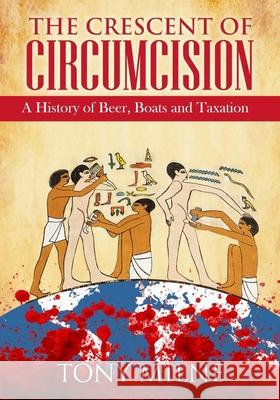The Crescent of Circumcision: A History of Beer, Boats and Taxation » książka
The Crescent of Circumcision: A History of Beer, Boats and Taxation
ISBN-13: 9781523632282 / Angielski / Miękka / 2016 / 268 str.
This is a sample book, 4 chapters, looking for a publisher. Real history is about banal subjects: the preference for drinking beer over wine or water; the selection of a type of sail to escape the narrow channel of a wind-swept estuary; the adoption of a 10% tax, rather than a 1% or a 50% tax; and above all the circumcision of young, muscular men. Today's confrontation between circumcised Americans and circumcised Muslims on the Crescent that links San Diego to Bali is no accident, but the inevitable outcome or man's horrific battle with his hormones, and his destiny to dominate the globe. Although popularly thought to be a religious or medical process, circumcision is clearly a geographic phenomenon that follows an arc from Northern Mexico to northern Australia, an arc formed by recent vulcanology. Along this arc lies a heavy concentration of humanity, indeed most of the world's densest populations. Thus, although proponents of circumcision claim social and medical benefits, and critics claim physical and psychological damage, the facts seem to show that demographic success is congruent with circumcision. None of which explains how it could have started as a social process along this arc, nor why it was successful. Circumcision is only one form of social control which allows the human adaptation of extreme gregariousness to function, and is merely a subset of behaviour which can be called taxation. Taxation is a rare, lop-sided transaction in which one party demands and receives a benefit, while the other contributes it. Curiously, the threat of violence is assumed, but rarely invoked. Modern man's defining characteristic is indeed his pacifism, his acquiescence. In comparison, every other wild animal and even man's primitive ancestors would fight to the death rather than pay taxes. And yet, the evidence throughout millennia and throughout the history of the great Empires is that this acquiescence is a strategy that succeeds in demographic terms. This combination of taxation and acquiescence is responsible for the great growth in human population, from the typical numbers experienced by early hominids, lions and wolves of a few million worldwide, to the billions of today, and the expected ten billion of tomorrow. No other large animal has been so successful. Success has been attributed to great men, yet there is little evidence that this success comes from their behaviour. The behaviour of great men differs little from that of men dead young, or that of abject failures. It appears that the success of men, enterprises and nations depends on a few specific actions, which can repeatedly be seen in every story of success. Each of these actions can be discerned as the driver of great empires, and human destiny can be followed through the development of new and better methods of doing them. Analysing the succession of European empires can allow us to understand today's political situation better, and to predict the future, and to minimise suffering if that is desired. For great empires require a victim, and it can be shown why. These victims have always existed in great empires, and can be easily identified today, although it is not always recognised as such. They are the ultimate tax-payers. This book sets out to show how humans have taxed others, how they choose a victim, and how some of those victims actually profit more from paying taxes than the tax-collectors who prey on them. For in the world of taxation there is local taxation and oppressive taxation, and while the oppressive variety creates the most suffering, local taxation creates great opportunities for wealth, not just for the tax-collector but for the tax-payer. Over many years, it is also clear that those responsible for oppressive taxation are themselves victims, of their desires, of their own suffering, of their genes. Humanity is locked in a cycle of taxation, whose success prevents a more humane way of life.
Zawartość książki może nie spełniać oczekiwań – reklamacje nie obejmują treści, która mogła nie być redakcyjnie ani merytorycznie opracowana.











